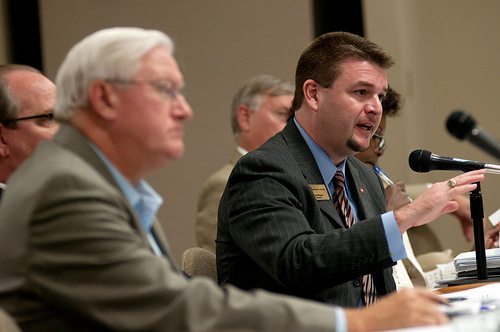Arkansas Senate Fails to Pass Bill to Defund Planned Parenthood
This time, state Sen. Rapert didn't get the extreme, anti-choice legislation he hoped for.

Arkansas state Sen. Jason Rapert (R-Conway) has gone after reproductive rights with a vengeance this legislative session. First he proposed the first “heartbeat” ban to ever successfully make it into law (albeit with modifications that make it slightly less restrictive). Then he followed up by proposing a bill that would block Planned Parenthood from receiving state grants; the legislation was meant in part to stop the group from providing comprehensive sex education in public schools.
Luckily, not everyone in the state senate felt the same as Rapert. The Arkansas senate failed to pass the defunding bill, voting 17 to 9 in favor (as a 35 person legislative body, the vote needed 18 yes votes to pass). Apparently some of the legislators recognized that if they truly want to see less abortions in the state, they shouldn’t block an organization that helps prevent unintended pregnancies from explaining to young people how not to get pregnant.
The Arkansas bill was designed to strip public funding from “affiliates that refer for abortions,” which could harm non-profit advocacy organizations other than Planned Parenthood. According to the Arkansas News Times, “Planned Parenthood officials warned that the measure would have unintended consequences by cutting off money to any person or entity referring a woman to an abortion provider. The proposal could end research grants to doctors or stop funding to domestic violence shelters if they refer women to abortion providers.”
Rapert’s defeated bill was a rewrite of an Americans United for Life piece of model legislation. The Arkansas version declared, “It is possible that public dollars made available by or through the State of Arkansas may be awarded to an entity that performs abortions or subsidizes or otherwise facilitates the entity’s ability to perform abortions although the funds were not disbursed specifically for the purpose of performing abortions.” This “all money is always fungible” belief does not appear to extend to religious crisis pregnancy centers, which many state legislatures are now advocating should be supported with taxpayer dollars.
The bill could come up for a re-vote down the road, which could give the senate a second chance to approve it. If so, as we’ve seen in the past, a veto by the governor is highly likely to be overridden.

